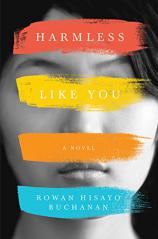Harmless Like You
Review
Harmless Like You
The struggling artist may be a literary staple, but the penniless writers and painters we encounter on the page usually have faith in their own talent, even if the world can’t see it yet. Not so with Yukiko Oyama, one of two main characters in Rowan Hisayo Buchanan’s debut, HARMLESS LIKE YOU.
Shy, awkward Yuki has a single, overpowering goal: to become an artist. But her ambition isn’t equal to her skill. From the opening pages, set in the late 1960s, where 16-year-old Yuki peers at the world through a cheap pair of yellow-lensed sunglasses, it’s clear she sees the world with the singular perception of an artist. Yet she can’t translate her inchoate ideas into meaningful work.
The child of a Japanese businessman on a long-term assignment in New York, Yuki is equally estranged from her American classmates and her traditional parents, who long to return to their home country. When her parents are finally called back to Tokyo, Yuki convinces them to let her stay in America, moving in with her friend Odile and Odile’s mother Lillian, a writer of bodice-ripping romance novels.
Yuki’s abandonment of her parents, who are heartbroken by her decision to remain in New York, is the first of many leavings in this perceptive novel. Buchanan expertly traces the contours of Yuki’s adolescent loneliness and her evolution into a woman who feels “as if her whole life might blow away.” Ultimately, Yuki will leave behind her husband and her young son, Jay, whose first-person narrative makes up the book’s other half.
"Yuki’s abandonment of her parents, who are heartbroken by her decision to remain in New York, is the first of many leavings in this perceptive novel."
In alternating sections, Buchanan explores the forces that lead to Yuki’s decision to desert her family and the effect of that desertion on her child. Jay, who now has a newborn of his own, still hasn’t come to terms with his loss, doubled after the recent unexpected death of his father. Ambivalent about parenthood (at one point, he describes his child as a “leechling”), he worries he’s inherited his mother’s tendency to flee responsibility, asking himself, “Was it also genetic, the twitching I felt in my hands, and the great desire to let go?”
Buchanan is fascinated by these strange family connections and how, as she said in an interview with The Guardian, “pain shape-shifts down the generations.” Yuki’s hurt is real, but, as she discovers, pain alone doesn’t produce great art. With support, she might develop confidence in her work, but as a woman and a minority, she’s isolated from the community she longs to join. The people she surrounds herself with treat her artistic ambitions as an amusing hobby, not a serious pursuit. Her boyfriend Lou, a sportswriter and wannabe poet, is casually cruel (he hits her) and uninterested in her painting and photographs. Yet he’s “the one human in all of the State of New York who belonged exclusively to her,” so she stays. When Lou inevitably leaves her for another woman, she marries Jay’s father, whose kindness baffles her more than Lou’s rages.
HARMLESS LIKE YOU is a novel about dislocation, both spiritual and physical. Early on Yuki compares herself to the chīzubāgā (cheeseburger) her mother makes for dinner, “enough to make a Japanese sick and still inauthentically American.” This sense of not belonging dogs Yuki throughout the novel, constantly throwing her off balance. Both she and Jay fall frequently. Yuki tumbles down stairs, slips in the bathroom and crashes her bike. Her son is plagued by fainting fits that are only kept at bay by an ugly, hairless therapy cat. In each case, their disconnection from the world around them manifests as an inability to control the body.
Ultimately, Jay is forced to seek out his mother, who’s been living for decades in Berlin, eking out a living as a conceptual artist. The reunion is strained, and not wholly satisfying for either them or the reader. We see it largely through Jay’s eyes, though Buchanan’s command of his character isn’t as strong as that of Yuki. The latter’s pain and desperation bleed through the page, while Jay is more of a cipher, a stunted man-child who cheats on his pregnant wife and admits to cataloguing the women he sleeps with, treating them more as an assemblage of parts than real people.
And what of Yuki, who fled a comfortable life in suburban Connecticut in an attempt to “learn to be kind”? She appears to have found peace, and the freedom she needs to create. In Berlin, her son sneers at her dingy apartment, worried over his mother’s poverty. What he doesn’t understand is “that it was hers, not rented, borrowed, or inherited: truly hers.” It’s an ending that’s both sad and sweet, and a testament to the lengths to which people are willing to go to carve out a space of their own in the world.
Reviewed by Megan Elliott on March 3, 2017
Harmless Like You
- Publication Date: February 28, 2017
- Genres: Fiction
- Hardcover: 256 pages
- Publisher: W. W. Norton & Company
- ISBN-10: 1324000740
- ISBN-13: 9781324000747





